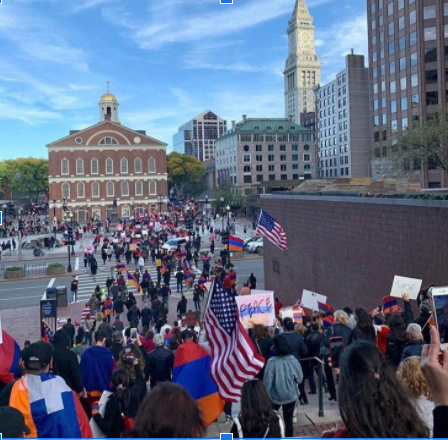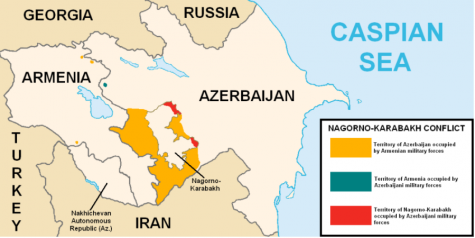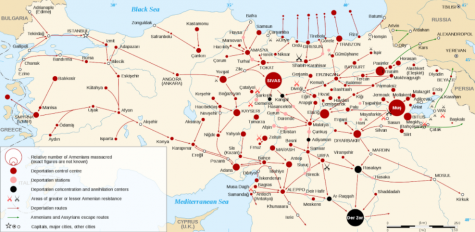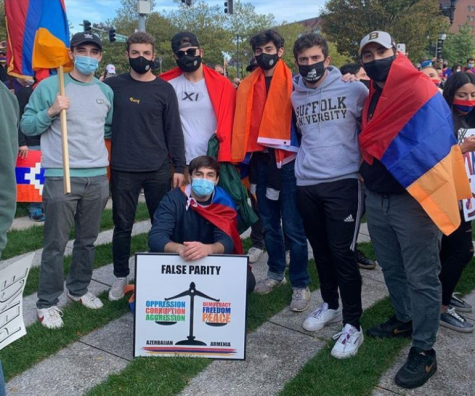On Sunday October 11, Armenians of the Greater Boston Area showed up in hundreds at the Armenian Heritage Park in Boston to protest the recent violation of ceasefire by Azerbaijan.
Radio Free Europe reported that Azerbaijan has been engaged in conflict with Armenia since this past summer over the ethnic Armenian but de jure Azeri enclave of Nagorno-Karabakh, formally known as the de facto Republic of Artsakh.
The Los Angeles Times reported that the consulate of Azerbaijan claims that Armenians are illegally occupying 20% of Azerbaijan’s “integral territory”, while Armenians refute this, insisting that the region has been Armenian since antiquity. The issue stems from the times of the Soviet Union, when Soviet dictator Joseph Stalin divided Armenian lands to Turkey and Azerbaijan in order to maintain good relations with the Turks, which is highlighted in a 2016 report from the BBC.

(Photo Courtesy of George Yeghyayan )
The conflict arose in the late 1980s and early 1990s, when the region voted with an absolute majority to join Armenia, which was met with suppression, violence and ethic cleansing by the government of Azerbaijan under Heydar Aliyev.
This sparked the Nagorno Karabakh War from 1988 to 1994, which resulted in a decisive Armenian victory, and nearly 30,000 total casualties from both sides combined according to a 2009 report from Euronews.
Since then, an acknowledged ceasefire between the two nations has occurred and Nagorno-Karabakh proclaimed its independence as the de facto Republic of Artsakh.
The Republic of Artsakh continues to struggle for global recognition of its independence, which would grant them independence or the opportunity to join Armenia. The majority of the member states of the United Nations still recognize it as part of Azerbaijan, despite numerous attempts of self-determination.

Armenians, who now form communities all over the world, support the Republic of Artsakh as they see it as another region in Armenia. The protest in Boston was one of many for Armenians, who have struggled for over 30 years with reclaiming their homeland. (Cilicia, 2014)
In fact, Armenia was much larger prior to World War I and the Turkish War of Independence, in which Armenians lost their western regions to Turkey. More land was lost as a result of the Soviets, and Armenia is now a rather small country located between two of its enemies.
Recep Tayyip Erdoğan of Turkey and İlham Aliyev of Azerbaijan have referred to their relationship as “two countries, one nation” due to the Turks and Azeris sharing a common ancestor, and having similar languages and cultures.
This ideology is known as Pan-Turkism, which is a far-right ideology that wants to establish a Turkic nation ranging from the Altai Mountains of Russia and Kazakhstan to deep into Central Europe.
This coincides with the Turkish policy of Neo-Ottomanism, which attempts to revive the Ottoman Empire, and reestablish Turkey’s control over the Balkans, Greece, Cyprus, Armenia, and the Middle East, as reported by the Middle East Eye in October.
This extremist ideology views the native Christian Armenians, Greeks, Cypriots and Assyrians as well as the Kurds, Persians and Arabs as enemies of the nation who need to be eliminated.
This culminated in the Armenian, Greek and Assyrian genocides of 1915, in which millions of people were exterminated by the Ottoman Turks. The highest estimated death toll was the killing of 1.5 million Armenians, a genocide which the Armenians have worked hard to be recognized worldwide for future prevention, according to the Armenian Genocide Memorial Institute.

Geocurrents reports that numerous governments worldwide are beginning to recognize the genocide, which angers Turkey and Azerbaijan who have dedicated millions of dollars to branches of their government working to maintain and spread genocide denial. Nearly every Armenian around the world today is affected by this horrible crime in history.
The protesters in Boston claim they have not only worked countless of hours toward genocide recognition, but also to stop Azerbaijan, who they believe will continue the ethnic cleansing if they were to gain control of the region.
Protestors were holding signs saying “Stop Azerbaijan,” “Artsakh is Armenia,” and “Armenia wants peace,” while they walked from the Armenian Heritage Park to the Turkish consulate general in Boston.
The Greater Boston area is home to a large Armenian population, and hundreds of people came to stand united against the attacks from Azerbaijan.
The organizer of the protest, George Barmakian, stated that he is hoping to get the attention of Massachusetts members of Congress who will then lobby to the federal government on Armenia’s behalf, to recognize Nagorno-Karabakh as Armenian and defend them from Azerbaijan.
He hopes the United States will end their relationship with Turkey, who has been a member of the North Atlantic Treaty Organization (NATO) since the Cold War Era.
“The weapons that are being sold (to Turkey) and the aid that’s being provided (from the US) are being used to attack innocent Armenians,” Barmakian told reporters at the protests. “I’m inspired by this, I’m motivated by this, and I want the rest of the world to see this. To see that we’re fighting for our people, fighting for our very existence.”
The protestors also wanted to emphasize why it is important for non-Armenians to get involved, describing how American taxpayer money goes towards arming the dictatorial regime of Turkey. They also explained how Armenia could provide a better ally as one of the most peaceful, democratic and developed countries in the region, which has also made many contributions to Western civilization and Christian culture throughout its thousands of years of history.
“It may be hard for many Americans to understand our situation, but this conflict is just another chapter of the same old story for Armenians,” said George Yeghyayan, a Suffolk University student of Armenian descent who attended the protest. “Not only have we been constantly attacked by the Turks and Azeris, but they will tell everyone that we are the aggressors.”
Yeghyayan said Armenia has allowed several foreign journalists to report on the issue, but Azerbaijan only allows its own or Turkish ones. Furthermore, according to the Human Rights Watch, as of 2019 Azerbaijan’s petro-oligarchic regime is considered amongst the least free countries in the world in regards to freedom of speech and a free press.

The current position of the United States government regarding the conflict remains neutral, but there have been more and more protests like the one in Boston across the country, and the world. (New York Times, October 2020) The American media is beginning to focus its attention on the conflict while politicians and public figures have come out to support Armenia and condemn Azerbaijan and Turkey.
The ceasefire that had been issued by Russia on October 10 showed some signs of improvement, however it was violated just days later. Euronews states that several global leaders have called for an immediate end to the violence as they are fearing a potential regional war. However, nobody knows for sure when all the violence will end.







